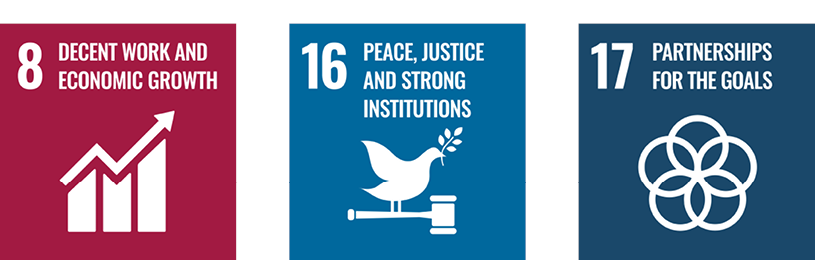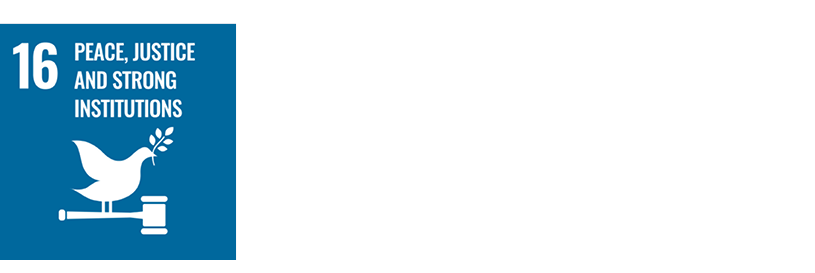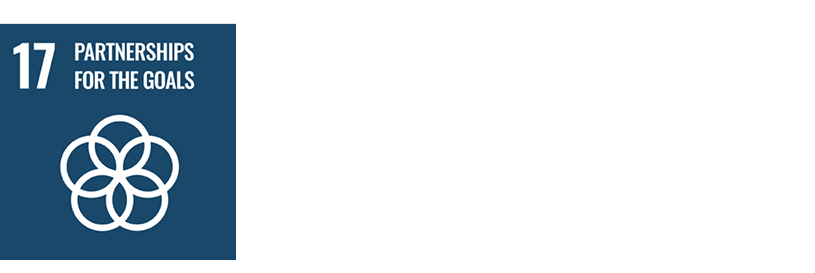The NAOF's audit and monitoring activities support the sustainability and stability of public finances and promote the transparency and cost-effectiveness of government. In this sustainability report, we disclose in greater detail how we act responsibly in society and how we reduce our own footprint.
1 Management’s review: We promote an open and sustainable society
Sustainability and responsibility can be described in many similar ways, and what they particularly share is a focus on promoting the Sustainable Development Goals (SDGs) and their various dimensions.
This sustainability report is based on the agreement concluded by the UN Member States on the Sustainable Development Goals, which aim to safeguard the wellbeing of people in an environmentally sustainable manner. In our report, we have strived to identify the SDGs that we can promote through our own actions: sustainable and stable public finances, transparent institutions and an open and cost-effective public administration provide the prerequisites for an economically, socially and ecologically sustainable society. The importance of this is emphasised by the uncertainty of the external operating environment. Ensuring sustainability increases our society’s resilience, the significance of which cannot be underestimated, especially in times like these.
Sustainability and responsibility are at the heart of our work: by carrying out our core activities effectively, we ensure sustainable management of public finances and an effective and transparent central government. For us, sustainability also means keeping in mind that we, too, are accountable for our own activities and knowing that we serve as an example for others. We always carry out audit and oversight activities comprehensively and conscientiously, within the limits of our audit rights. Efficient performance of our main task is the key element of our strategy.
We have made responsibility one of our three values alongside objectivity and courage. Our values steer our activities both within the NAOF and in relation to our stakeholders. Respect for others and openness also steer our work and ensure responsibility.
Sami Yläoutinen
Auditor General
2 The NAOF in brief: We produce reliable audit and oversight information
The National Audit Office of Finland (NAOF) is an independent external Supreme Audit Institution, which operates in affiliation with Parliament. We work to ensure responsible use of central government funds and transparency: we audit the legality and appropriateness of the state’s financial management, monitor fiscal policy and oversee political party and election campaign funding and the use of the Finnish Transparency Register. In addition, we process complaints and reports on irregularities concerning central government finances and financial management.
At the end of 2024, the NAOF had 150 employees. Our head office is located in Ruoholahti, Helsinki. We also have an office in Oulu. The National Audit Office is headed by the Auditor General and organised in three units: the Audit Unit, the Monitoring and Oversight Unit and the Shared Services Unit.
We reformed the NAOF’s strategy, and during the strategy period that started in 2024, we aim to strengthen the NAOF’s accountability to Parliament and citizens through our audit and oversight work. We produce reliable and relevant information on topics significant to central government finances and financial management exercising our audit and oversight rights appropriately and according to plan. Through our activities, we support efficient and lawful government and promote productivity, economic efficiency and cost-effectiveness in the central government. Correct targeting of our audit and oversight activities is extremely important in the challenging circumstances of general government finances.
We monitor the implementation of the priorities and enablers of our strategy period through the NAOF’s impact and performance targets. Our values are responsibility, objectivity and courage. They steer our internal and external activities. We set our operational targets and indicators related to responsibility as part of the planning of our activities and finances.
CASE: Management reporting enables knowledge-based decision-making
Advanced and up-to-date management reporting plays a key role in monitoring the strategic long-term objectives. Management reporting has been developed at the NAOF from 2023 to 2025, and now the management has comprehensive insights into the achievement of operational objectives, finances, personnel, projects, costs, working hours and well-being at work.
Through automation, data from the state’s shared information systems is efficiently and reliably accessed and reported according to the content on a daily, monthly, quarterly or annual basis. Building the reporting system has been a major effort, but it saves a significant amount of working time annually, while also greatly improving the usability of data in supporting the management.
3 The handprint of our activities: We have a comprehensive and responsible impact
We have identified the Sustainable Development Goals that we have promoted in particular through our activities. SDGs 8, 16 and 17 are at the heart of our activities. Target 16.6., Develop effective, accountable and transparent institutions at all levels, in particular, is directly related to our main tasks defined in the law.
In the following, we will report on the promotion of the SDGs from the perspective of our different functions, which promote more than one SDG simultaneously. The effectiveness of our activities in relation to the SDGs is based on the high-quality performance of our core tasks and the achievement of our performance targets.
We support sustainable management of general government finances
Sustainable and stable public finances are a prerequisite for an economically, socially and ecologically sustainable society. The basic task of the NAOF’s fiscal policy monitoring function is to support responsible management of public finances through monitoring compliance with fiscal rules, assessing the management of public finances and providing opinions on these subjects.
We reported our main findings on the Government’s fiscal policy to Parliament in December 2024. Our assessment focused on the measures taken by Prime Minister Orpo’s Government to strengthen public finances and their adequacy from the perspective of the objectives. Based on our assessment, we found that bending the growth curve of the debt ratio, which is one of the Government’s objective, is unlikely and that the strengthening of public finances should be continued beyond parliamentary terms. We also analysed factors behind the sustained growth of public debt.
We monitor compliance with the common fiscal policy rules, which are essential for the EU’s policy coordination. The fundamental purpose of these rules is to safeguard the stability of public finances from the macroeconomic perspective. A new EU fiscal framework was introduced in 2024. The new framework aims to take the debt sustainability in each Member State better into account within the limits set by the framework. In order to promote a transparent and easy-to-understand fiscal framework, we described the elements of the new EU framework and the significance of the new framework to Finland in the report we submitted to Parliament in December and in other posts we published.
We also assessed fiscal policy from the perspective of its appropriateness in view of the business cycle. In accordance with SDG 8, this is important for regulating total demand in the national economy and, for example, for managing employment.
We also assess the reliability of the forecasts of the Ministry of Finance on a regular basis to verify the information base and transparency of fiscal policy. In 2024, we continued the annual assessment of the realism of the most recent forecasts. In addition, we audited the Ministry of Finance’s methods of forecasting general government debt (13/2024).
We ensure the efficiency, accountability and transparency of institutions
Under the Constitution of Finland, the NAOF’s task is to audit the management of central government finances and compliance with the state budget. In our financial audits, we verify the reliability and usability of the information on central government finances and the realisation of good governance. Financial audits also prevent corruption. In addition, financial audits promote the transparency of public activities and general government finances. Reliable information on central government finances and the state’s financial position contribute to sustainable public finances. Our expertise and views are formed in connection with our audit activities.
The significant challenges faced by Finland’s public finances highlight the importance of a well-functioning and cost-effective central government as well as sustainable and transparent use of public funds. The accountability of the central government ensures that public funds are used in compliance with the law and Parliament’s decisions. Our audit activities contribute to the achievement of these objectives.
We submit financial audit reports annually to the central government accounting offices. For the financial year 2024, we submitted 61 financial audit reports. We also submitted a financial audit report to three off-budget funds, one international organisation and two institutions of the Nordic Council of Ministers. In addition, we submitted a financial audit report on the final central government accounts and prepared a summary report on the financial audits.
In 2024, we published audit reports on a total of 12 performance audits, two compliance audits and two fiscal policy audits. As our audits are targeted at the entire central government, our reports contribute broadly to several Sustainable Development Goals.
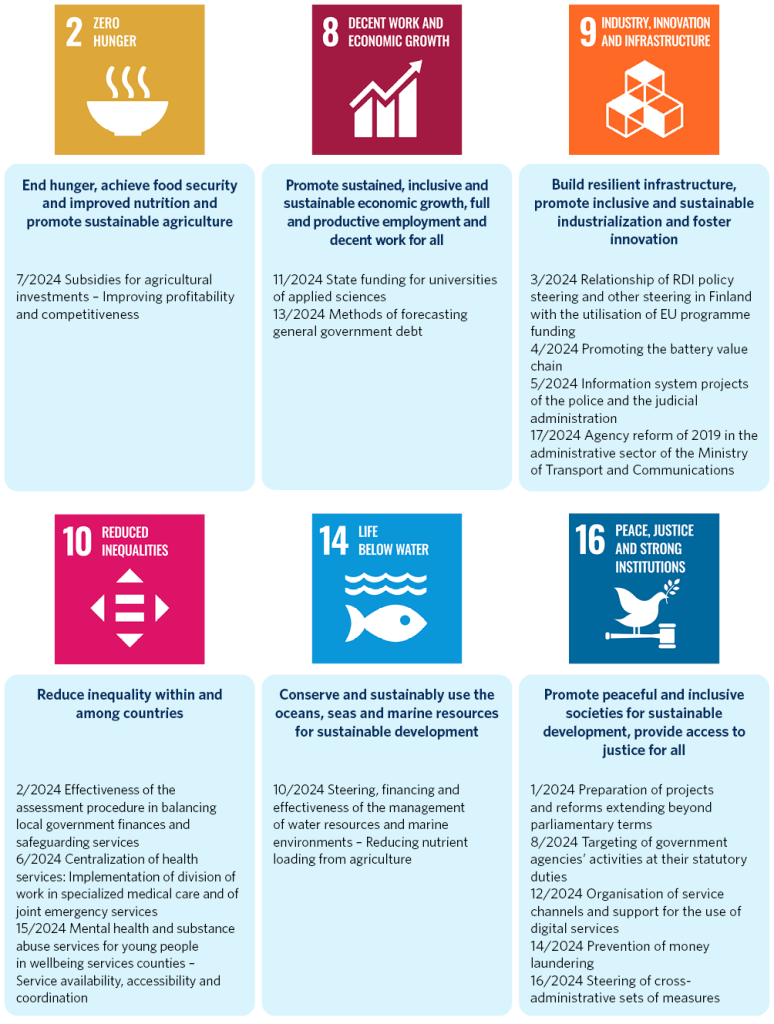
The National Audit Office monitors systematically the measures that public administration has taken on the basis of the conclusions and recommendations presented in its reports. We assess the implementation of the recommendations made in an audit report by conducting a follow-up usually about three years after the audit report was issued. Based on the follow-ups conducted, we found that about 85 per cent of our recommendations had been implemented either in full or in part while the target was 82 per cent. The number of recommendations assessed in follow-ups was 47. In 2023, 81 per cent of the recommendations had been implemented either in full or in part, while in 2022, the corresponding figure was 78 per cent.
| Indicator | Outturn in 2021 | Outturn in 2022 | Outturn in 2023 | Outturn in 2024 | Target for 2024 |
| Recommendations made in financial audits implemented either in full or in part (%) | 85 | 88 | 93 | 91 | 85 |
| Recommendations made in other audits implemented either in full or in part (%) | 82 | 78 | 81 | 85 | 82 |
| Audit and oversight reports in total (No.) | 87 | 86 | 90 | 89 | 88 |
| Follow-up reports (No.) | 27 | 16 | 22 | 11 | 15 |
| Audits of political party funding (No.) | 52 | 56 | 52 | 36 | – |
The information presented in Table 1 is available in an accessible Excel format here.
Of the recommendations made in financial audits, 91 per cent had been implemented while the target was 85 per cent. The number of assessed recommendations was 291. In 2023, 93 per cent of the recommendations had been implemented while in 2022, the corresponding figure was 88 per cent. Monitoring the implementation of financial audit recommendations is part of the financial audit process, and therefore no separate follow-ups are carried out.
We promote efficient and transparent public administration
The fight against corruption promotes efficient and transparent government. By overseeing political party and election campaign funding, the NAOF participates in the fight against corruption and bribery. In Finland, legislation aims to increase the transparency of political funding, provide information on candidates’ possible ties to third parties and limit campaign costs. Our oversight activities ensure that political party and election campaign funding comply with the relevant legislation and that citizens have up-to-date information on political funding in Finland.
We oversee that all actors within the scope of the law file an election funding disclosure. In addition, we oversee the accuracy of the information reported to us in connection with each election. We publish all the disclosures we have received as well as our election-specific oversight reports on our website. In 2024, we oversaw compliance with the obligation to disclose election funding and election campaign costs in the presidential election and the European Parliament elections.
With regard to political party funding, we oversee that political parties and party organisations comply with the provisions of the Act on Political Parties. We oversee, for example, external support and disclosing it and publish documents submitted to us by political parties. In addition, we oversee the use of government grants to political parties, i.e. party subsidies. In 2024, we audited 36 party organisations. We also publish the findings of the oversight of political party funding on our website. We report to Parliament on the oversight of election funding by election and on the oversight of political party funding annually.
In addition, we promote efficient and transparent public administration by receiving complaints and reports on irregularities. Anyone can file a complaint about any action that is in violation of the state budget or otherwise unlawful from the perspective of the management of central government finances. Central government authorities must, without delay, report to us any irregularities in their activities. By receiving and processing complaints and reports on irregularities, we ensure that public administration operates transparently and is accountable for its activities.
The processing of complaints and reports on irregularities and the resolutions made in relation to them provide us with important information on shortcomings or irregularities found in the activities of public authorities. We also take the complaints submitted to us into account when planning our audit activities. If an irregularity found in the activities of a public authority were so serious that it would be regarded as an offence and if the authority itself did not take action, the NAOF would have to report the offence.
The purpose of the Finnish Transparency Register is to improve the transparency of decision-making, combat inappropriate influencing and strengthen citizens’ trust. Lobbying is regarded as an acceptable part of the democratic system, and the Transparency Register makes it transparent. According to the Act on the Finnish Transparency Register, the National Audit Office is the registrar of the Finnish Transparency Register and is also responsible for overseeing compliance with the disclosure obligations related to the register.
We support the audit of cross-border topics through cooperation
Cooperation with domestic and international stakeholders is also important from the perspective of sustainability. According to our strategy, we must act efficiently and transparently in order to succeed in our work. Our most important domestic stakeholders include the audited entities and the entire central government as well as Members of Parliament and the public officials of Parliament who utilise the audit and oversight information we produce. On our website, the media and the general public also have access to the reports we have prepared on the results of our audit and oversight activities. The key actors in our stakeholder cooperation also include the research and organisation fields. The development of our activities is supported by a statutory Advisory Board, which consists of representatives of our key stakeholders.
Participation in international cooperation and networks provides us with information and experience on both new methods and topical issues, which can support our audit and oversight activities and their planning. The importance of international cooperation is particularly emphasised in new, topical and cross-border topics. Our key cooperation partners include the international umbrella organisations of Supreme Audit Institutions (SAIs) EUROSAI and INTOSAI, the EU countries, the EU institutions and the SAIs of the Nordic countries. In 2024, we were active, for example, in the INTOSAI Working Group on Environmental Auditing (WGEA) and the INTOSAI Big Data working group, the EUROSAI working groups on environmental auditing and IT audit, and the Network on Fiscal Policy Audit, which operates under the EU Contact Committee and is chaired by us.
In our role as the current chair of the INTOSAI WGEA, we promote the SDGs globally. We collect, prepare and share guidelines and best practices for environmental audit so that SAIs can develop the sustainability, efficiency, accountability and transparency of public administration in their own countries. We also communicate the results of our audits to UN actors.
CASE: The WGEA has brought new perspectives to the discussion between SAIs
During its chairmanship, the NAOF has replaced some of the meetings requiring travel by online meetings. However, in-person meetings are also needed for networking and promoting cooperation. When members are invited on-site, the meeting agenda is planned as ambitiously as possible.
The main event of the Finnish WGEA chairmanship was the WGEA Assembly held in Rovaniemi in January 2024. It gathered 120 participants from 43 different countries. The special themes of the meeting were the rapidly changing Arctic environment and Indigenous knowledge. As the climate is warming up, the intergenerational knowledge of Indigenous peoples, which is based on a close relationship with nature, can be important in adapting to the rapidly changing environment. The meeting revealed that Indigenous knowledge is an important theme in many countries, such as Australia and New Zealand. As a result of the Rovaniemi Assembly, a separate network of SAIs focusing on Indigenous issues was established. The theme of the annual collaborative course organised with the University of Helsinki was also Indigenous knowledge in 2024.
As the WGEA’s chair, the NAOF leads international cooperation in relation to climate change and biodiversity as well as the green economy. Yet another theme during the NAOF’s chairmanship is the emphasis on a long-term approach, as future generations are at the heart of sustainable development. We have encouraged SAIs to pay attention to the time frame within which public administration assesses future impacts as well as the time horizon of their own assessments. The working group is committed to the United Nations’ Sustainable Development Goals. At the same time, it emphasises that the goals of the 2030 Agenda alone are not sufficient because they do not take the intergenerational perspective into account. In addition to these, we need goals that stem from the concept of sustainable development and extend across generations.
4 The footprint of our activities: We are reducing our footprint
This chapter describes how we have taken into account the ecological, social and economic impacts of our activities. Our operational and financial plan for 2024–2027 sets quantitative targets for some indicators related to the footprint of our activities. With some indicators, the general aim is to reduce the footprint of our activities and to take negative impacts into consideration in the development of our activities.
Environmental responsibility
Office premises and energy
Our head office is located in Helsinki, in a property owned by Ilmarinen Mutual Pension Insurance Company. The building has the largest property-specific solar power plant in Helsinki. Since 2018, the property has had the LEED EB Gold certification, which steers the activities and environmental impacts of the property and its tenants in relation to energy efficiency, waste management and recycling. The electricity used in the property and the district cooling used for cooling the premises are fully carbon neutral.
| Energy consumption [1] | 2021 | 2022 | 2023 | 2024 |
| Electricity, MWh | 54 | 69 | 70 | 70 |
| District heating, MWh | 115 | 109 | 109 | 99 |
| District cooling, MWh | 46 | 47 | 36 | 40 |
| Total, MWh | 215 | 225 | 215 | 209 |
The flexible remote work opportunities offered to our staff have been taken into account in the need for office space. Virtual meeting solutions and remote work have reduced the travel of our staff between the home and the workplace. The lease for our Oulu office expired in October 2024. We strived to take sustainable development considerations into account when looking for a solution to replace the office.
CASE: Oulu office moved to a shared work environment
After the lease for the Oulu office ended, a shared work environment provided by Senate Properties was chosen as the new office for our Oulu staff. In this space, the National Audit Office shares premises with other government agencies. The premises are located in the former barracks of the 1st Separate Signal Company, which was built in 1953 and been converted into a modern flexible workspace. Our staff has dedicated workspaces, but some services and facilities – such as staff facilities and break rooms – are shared with other organisations. Overall, the decision made on the premises aimed at a responsible and sustainable alternative. Sustainability steers the activities of Senate Properties and includes environmentally responsible operations. Sustainability – Senate Properties (Opens in a new tab).
Travel
Our officials’ travel complies with the central government’s travel strategy, which aims to reduce the environmental load. The amount of our air travel has decreased from the years preceding the Covid-19 pandemic but has showed a steady increase over the past two years.
| Air travel [2] | 2019 | 2020 | 2021 | 2022 | 2023 | 2024 |
| Kilometres | 1,192,414 | 193,500 | 12,481 | 192,149 | 273,352 | 340,100 |
| Emissions, CO2e kg | 165,420 | 22,060 | 1,090 | 20,922 | 29,902 | 49,020 |
In travel, we favour public transport. Remote and hybrid meetings have become increasingly common in international cooperation as well. This contributes to sustainability through reducing travel.
CASE: Piloting of the HSL business travel ticket
At the end of the year, after a pilot phase, we introduced the business travel ticket offered by HSL in order to make the use of public transport in the Greater Helsinki Area smoother for our staff when travelling for work-related purposes. Our goal is to ensure that public transport is used for travel during the workday and that the related administrative processes are as light as possible so that time can be saved for the core tasks. Our staff’s feedback on the use of the business travel ticket has been very positive.
Procurement
In our procurements, we primarily utilise contracts tendered by Hansel Ltd, the central purchasing body of public administration. Our procurement manual also requires that we take the environmental impacts, ethics and quality of the procurement into account throughout the life cycle of the contract.
Based on our purchase invoices, the product and service groups that were the biggest contributors to our carbon footprint in 2024 were the rental of buildings and apartments (0.14 million CO2 eq./kg), software and intangible rights (0.07 million CO2 eq./kg), ICT services (0.07 CO2 eq./kg) and occupational health services (0.07 CO2 eq./kg).
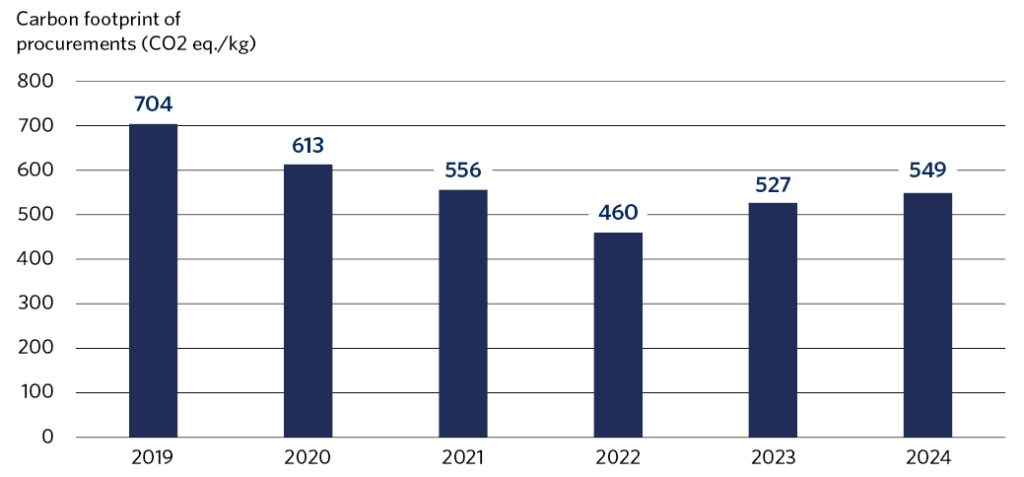
Social responsibility
We monitor the work satisfaction of our staff annually. In 2024, the target set for the overall job satisfaction among the staff was exceeded again. The target was 3.6, and according to the survey, the overall satisfaction was 3.9 (3.8 in 2023, 3.4 in 2022). The leadership index also increased slightly from the previous year, exceeding the target set for it by a significant margin. The leadership index in 2024 was 3.9, while the target was 3.4 (3.8 in 2023, 3.2 in 2022). The objectives set for our wellbeing at work are determined annually. The possibility of flexible working has in several years appeared as an issue that promotes wellbeing at work and that should be maintained.
The sickness absences of our staff increased in 2024 but were clearly below the central government average. In competence development, we achieved our target: our employees use on average 5.2 working days per person for education and training. In 2024, eight of our auditors completed the training on sustainability reporting and its assurance, after which it is possible to register as a Sustainability Reporting Auditor (SRA).
The new Equality Committee began its term on 1 May 2024. The Equality Committee monitors recruitments, for example, from the perspective of equality and non-discrimination. The Committee meets regularly and informs the whole staff about the topics that have been on its agenda. In addition, the Equality Committee has opened a communication channel for the staff, through which everyone can raise both topics to be addressed and their own observations they would like the Committee to investigate.
| Indicator | Outturn in 2021 | Outturn in 2022 | Outturn in 2023 | Outturn in 2024 | Target for 2024 |
| Job satisfaction index (1–5) | 3.3 | 3.4 | 3.8 | 3.9 | 3.6 |
| Leadership index (1–5) | 3.0 | 3.2 | 3.8 | 3.9 | 3.4 |
| Absences due to sickness (days/person-year) | 4.2 | 6.6 | 4.1 | 6.0 | less than 8.1 |
| Time spent on education and training (days/person-year) | 4.8 | 2.5 | 5.0 | 5.2 | 5.0 |
Financial responsibility
A total of EUR 21.0 million had been allocated to our activities in 2024. The total expenditure of the NAOF increased by approximately EUR 1 million from the previous year, which was mainly due to the increase in personnel expenses and purchased services. Personnel expenses account for the majority of the NAOF’s total expenditure (about 81%). As an indicator of the economic efficiency of our activities, we reported the cost of a working day spent on core activities, which increased slightly from the previous year but was below the quantitative target. As a rule, the increase in the expenditure of the core activities was due to the increase in salary expenses and the increase in working hours spent on core activities.
| Indicator | Outturn in 2021 | Outturn in 2022 | Outturn in 2023 | Outturn in 2024 | Target for 2024 |
| Cost of a working day used for core activities (€) | 842 | 788 | 802 | 819 | 825 |
We are committed to reducing, on our own initiative, the NAOF’s operating expenditure appropriation by a total of EUR 0.6 million by 2027 according to the guidelines issued by the Parliamentary Office Commission last year.
Overall, we assess that the effectiveness of our activities improved in 2024. Based on the achievement of the targets set for our key figures, we achieved our performance targets either well or fairly well. More detailed information on the cost-effectiveness and efficiency of our activities is available in our final accounts (in Finnish).
The information in Tables 2, 3, 4 and 5 is available in an accessible Excel format here.
5 Report drafting process
This report is drawn up for the third time. As regards the Sustainable Development Goals, we selected three SDGs that we address in this report. However, as stated in the report, some of the tasks of the National Audit Office address several SDGs at the same time. As sustainability indicators, we have selected such existing indicators reflecting the NAOF’s activities and finances for which we have set targets as part of the regular process of planning our activities and finances.
We prepared the report at the management’s request as part of the monitoring of our own activities and the accountability for our own actions. The report texts have been compiled by the staff of different units, and the preparations have been coordinated by the Communication and Financial Services groups. Before its adoption and publication, the sustainability report was discussed in the NAOF’s management group meeting on 23 April 2025.
[1] The electricity consumption is presented according to the consumption of the Helsinki office. The incorrect electricity consumption data for 2021–2023 in the previous year’s report have been corrected. Other energy consumption has been calculated by dividing the consumption of the property by the share of the NAOF’s office premises in the whole area of the property. The NAOF’s share of the total area is 2.7%. The figures do not include the energy consumption of the Oulu office. The share of the Oulu office of the total consumption is very small.
[2] The figures are based on the data provided by our contract travel agency, CWT Finland Ltd.
[3] The data are based on a calculation model developed by the Finnish Environment Institute (SYKEra 15/2019). The estimates of the carbon footprint of the procurement categories are based on the average carbon footprints of the products on the Finnish market and do not necessarily correspond to the actual carbon footprint of the individual procurements.


